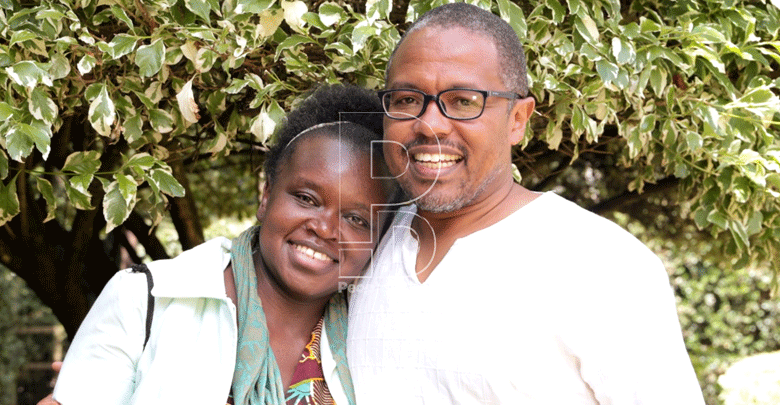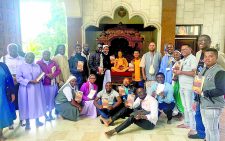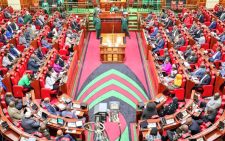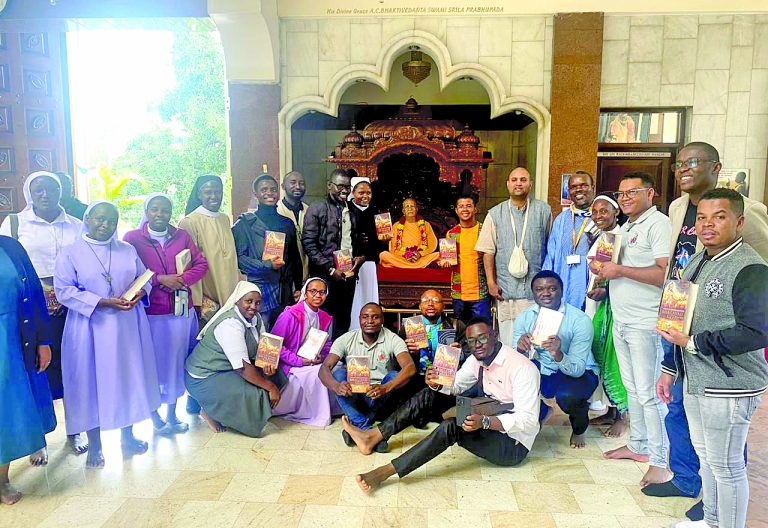Veteran whose values remain unchanged

At a time when some gospel artistes have compromised the content and style of doing gospel music, Henrie Mutuku still stands out. Her husband, Charles Maina Njau, tells us more about her journey.
Harriet James @harriet86jim
In early 2000s, Henrie Mutuku ruled the airwaves with her soothing voice and powerful lyrics.
The Nakuhitaji hitmaker rose to stardom after dual winning the Kora awards 2002 Best Artiste East Africa (with Eric Wainaina).
Her star continued to shine that in 2003, Henrie won two Kisima Awards for Best Female Artiste and Best Contemporary Gospel Artiste and also earned another Kora nomination in the same year.
Her husband, Charles Maina Njau says her passion for music is unmatched.
The two tied the knot in a low-key affair in 2014. They had met in church.
Henrie noticed his kind heart and the fact that he was a true gentleman, ensuring that all women were escorted home after a kesha or youth group meeting.
“We share a love for good books, hymns, poetry and love for God. I am a tentmaking pastor at Buruburu Baptist Church and also a sports administrator with the Kenya Darts Association.
Occasionally, I assist other sports bodies such as CECAFA, Kenya Volleyball Federation, among others,” says Charles
Henrie took a hiatus from music after marriage to focus on family, which was one of the toughest, but rewarding moments in her life.
“She was wisely advised to make family more of a priority than her career and has done her best to follow that advise.
Submission has been one of the toughest lessons that she has had to learn,” he notes
One of her favourite moments is during family devotions when her husband leads the hymns.
Her passion for that genre of music goes way back to her childhood days during family reunions on days such as Christmas when her grandparents would gather them around and they would sing hymns and have family devotions.
Love for hymns
“Her grandparents were among the first-generation Christians in Ukambani and they created the legacy of singing hymns and family Bible devotions.
It’s something that has inspired her to date. She has a habit of breaking into hymns each time we gather as a family,” he says.
Henrie’s passion for music, therefore, began in her childhood and she would sing hymns heartily in church.
In her youth, she joined the church choir where her talent was enhanced.
She was also an active member of the drama club and choir mistress in Loreto High School, Limuru, where her love and interest in music was solidified.
In addition to music, her poetry talent was often spotted and she would be requested to represent her church and school in worship services and competitions.
“She has sang in church choir, worship team, Christian Union, singing groups such as More Than Conquerers (MTC) and Prayer Partners (PPs).
She has also served as a back-up vocalist for artistes such as Izzo and Pete Odera,” narrates her husband
Henrie was encouraged by seasoned musicians to start recording her music after performing her own compositions in several neighbourhood church-sponsored concerts.
“Henrie agreed because she discovered that she was poor at door-to-door evangelism (a monthly requirement of my home church).
She felt that music would be the best instrument to break the ice and bring people to salvation,” he adds.
However, she struggled for seven years looking for good studios, participating in competitions and making relationships that could recognise her music.
“On the seventh year, she got a breakthrough when she won nominations and an international award.
She was nominated as an African female artist of the year and won East Africa female artiste of the year 2002 Kora Awards.
She went on a winning spree bagging two Kisima Awards in 2003 and another nomination at Kora Awards.
The wins encouraged her to take her music seriously,” adds her husband
Her Christian upbringing and also the fact that she was raised in Eastlands, Nairobi influenced her style of music, which was mainly done in Kiswahili, English, Kamba (her mother tongue) and also Sheng.
Yesteryears versus today
Her name, Henrie, is in honour of her late uncle Henry Musyoki Kilonzi whom she describes as a generous man who desired for all of them to live in an honest and humble way.
“He chipped in my first photography shoot and bought my ticket to England when I went there to record my second album, Tena in 2017.
He also urged me to insure my voice, which I am yet to do. He passed away a few years back, but I am yet to come to terms with the fact that he is no longer with us,” says Henrie.
With the wins also came challenges including being linked to immorality, coming face to face with jealousy as well as poor payment by distributors.
“Poor payment by promoters, distributors and organisations that collect music royalties slows down productivity.
By now, she would have produced and released so many songs, but lack of finance is an impediment,” Charles reveals.
Henrie is happy now that music, and gospel in particular, is being taken seriously than when she was starting out.
However, she is saddened by how gospel musicians have focussed more on money that on spreading the word.
“It is unfortunate that many people in the music industry are money minded. She chooses to take her passion in music as a profession and a service,” he says.
It is this commercialisation that also made her draw back and reflect, soul search and also focus on how best she would serve God even as a musician.
Henrie is currently trying to revive her old hymns, noticing their potency and power and has been trying to introduce this passion to her generation.
“For a long while, she felt like she was out of sync with the music scene, but now with the hymns, she feels that she will bring soberness in the gospel scene.
She has released four hymns and a poem. The Cross, Secure and He Will Wipe Our Tears were released over the Easter period to mid 2018.
Taji Zetu and the poem, Born, were released for last year’s Christmas season,” Charles reveals in conclusion.












